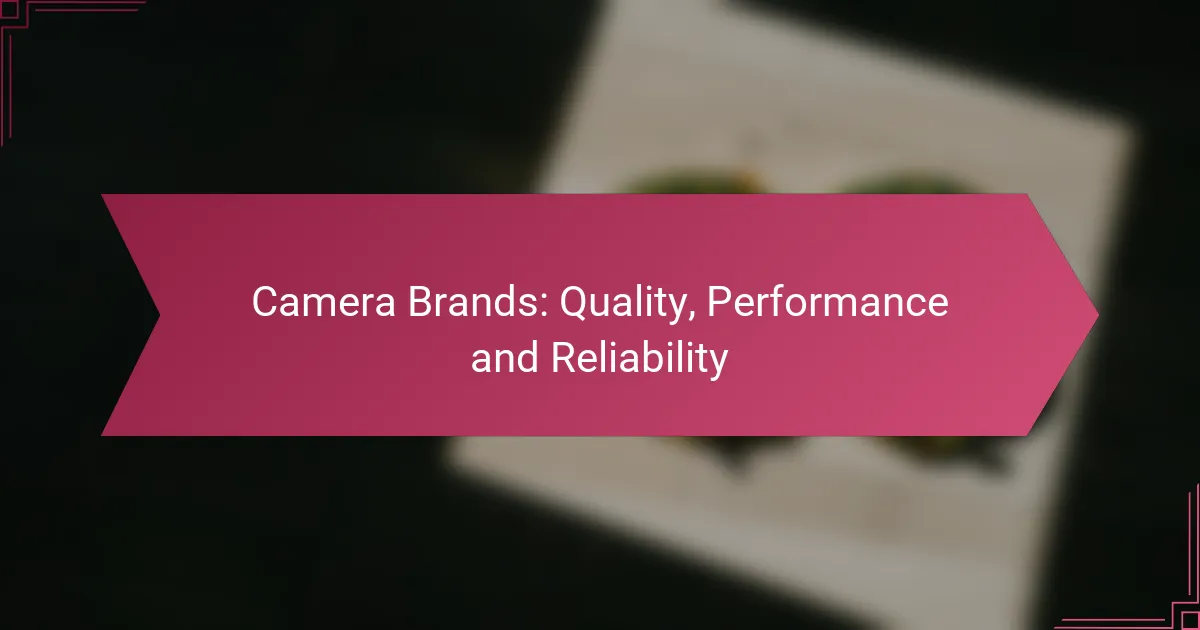When selecting a camera, understanding the quality, performance, and reliability of various brands is essential. Leading names like Canon, Nikon, Sony, Fujifilm, and Panasonic offer a range of options that cater to both amateur and professional photographers. To make an informed choice, consider exploring the unique strengths of each brand, especially in areas such as image quality, autofocus speed, and low-light performance. For more insights, check out our guide on Cinematic Wedding Photography: Equipment Choices, which can help you identify the features that best suit your needs.

Which Camera Brands Offer the Best Quality?
Several camera brands are renowned for their quality, performance, and reliability. Canon, Nikon, Sony, Fujifilm, and Panasonic consistently rank among the top choices for both amateur and professional photographers.
Canon
Canon is widely recognized for its exceptional image quality and robust build. Their DSLRs and mirrorless cameras often feature advanced autofocus systems and a wide range of lenses, making them suitable for various photography styles.
When choosing a Canon camera, consider models like the EOS R series for mirrorless options or the EOS 90D for DSLRs. Both offer high-resolution sensors and impressive low-light performance.
Nikon
Nikon cameras are known for their excellent dynamic range and color accuracy. They provide a solid selection of lenses and accessories, appealing to both enthusiasts and professionals.
The Nikon Z series mirrorless cameras, such as the Z6 II, deliver outstanding performance in various conditions. For traditionalists, the D850 DSLR remains a top choice for its versatility and image quality.
Sony
Sony has made a significant impact in the camera market with its innovative technology and compact designs. Their mirrorless cameras, particularly the Alpha series, are praised for their fast autofocus and video capabilities.
Models like the Sony A7 III offer a great balance of quality and performance, making them ideal for both photography and videography. Consider the A6400 for a more budget-friendly option without sacrificing quality.
Fujifilm
Fujifilm stands out for its unique color science and retro design. Their X series mirrorless cameras are particularly popular among street and portrait photographers for their aesthetic appeal and film simulation modes.
The Fujifilm X-T4 is a versatile choice, combining high-quality stills with impressive video features. Additionally, the compact X100 series offers excellent image quality in a portable package.
Panasonic
Panasonic is well-regarded for its video capabilities, especially in the Lumix series. Their cameras are favored by videographers for features like 4K recording and advanced stabilization systems.
The Lumix GH5 is a standout model for hybrid shooters, providing excellent video quality alongside solid still photography performance. For those focused on portability, the Lumix GX series offers compact options without compromising on features.

How Do Camera Brands Compare in Performance?
Camera brands vary significantly in performance, impacting image quality, autofocus speed, low-light capabilities, and video features. Understanding these differences can help you choose the right camera for your needs.
Image Quality
Image quality is primarily determined by sensor size, resolution, and lens quality. Larger sensors typically capture more light and detail, resulting in clearer images. Brands like Canon and Nikon are renowned for their high-quality lenses that enhance overall image fidelity.
When comparing cameras, consider the megapixel count, but remember that more pixels do not always equate to better quality. Look for reviews and sample images to gauge real-world performance rather than relying solely on specifications.
Autofocus Speed
Autofocus speed is crucial for capturing sharp images, especially in dynamic situations. Brands such as Sony and Canon have developed advanced autofocus systems that can lock onto subjects in milliseconds, making them ideal for sports and wildlife photography.
When evaluating autofocus, consider the number of focus points and the type of autofocus technology used, such as phase detection or contrast detection. A camera with a higher number of focus points generally offers better tracking of moving subjects.
Low-Light Performance
Low-light performance is essential for shooting in dim environments without sacrificing image quality. Cameras with larger sensors and wider apertures tend to perform better in low-light conditions, producing clearer images with less noise.
Brands like Fujifilm and Sony are known for their excellent low-light capabilities, often allowing for higher ISO settings without significant degradation in image quality. When choosing a camera, look for models that handle noise well at higher ISO levels.
Video Capabilities
Video capabilities vary widely among camera brands, with some offering advanced features like 4K recording, high frame rates, and in-body stabilization. Panasonic and Sony are leaders in this area, providing cameras that cater to videographers with professional-grade features.
When selecting a camera for video, consider the resolution, frame rate options, and additional features like microphone inputs and headphone jacks. These elements can significantly enhance your video production quality.

What Factors Contribute to Camera Reliability?
Camera reliability is influenced by several key factors, including build quality, weather sealing, and warranty and support. These elements determine how well a camera can perform under various conditions and how long it will last with regular use.
Build Quality
Build quality refers to the materials and construction techniques used in a camera. Cameras with a sturdy metal body and high-quality plastics tend to withstand wear and tear better than those made from cheaper materials. Look for models that are designed for durability, especially if you plan to use them in demanding environments.
When assessing build quality, consider features like the weight and feel of the camera in your hands. Heavier cameras often indicate more robust construction, while lightweight models may compromise on durability. Additionally, check for user reviews that highlight long-term performance and any reported issues.
Weather Sealing
Weather sealing protects cameras from moisture, dust, and extreme temperatures, enhancing their reliability in challenging conditions. Cameras with good weather sealing often feature gaskets and seals around buttons and openings to prevent water and debris from entering.
For outdoor photographers, investing in a weather-sealed camera can be crucial. Look for models that are rated for specific environmental conditions, such as rain or extreme cold. This feature can significantly extend the lifespan of your camera in unpredictable weather.
Warranty and Support
A solid warranty and responsive customer support are essential for ensuring camera reliability over time. Most reputable brands offer warranties ranging from one to three years, covering defects and malfunctions. A longer warranty often indicates the manufacturer’s confidence in their product’s durability.
Before purchasing, research the brand’s customer support reputation. Brands with responsive service can help resolve issues quickly, reducing downtime. Additionally, consider extended warranty options for added peace of mind, especially for high-end models that may require costly repairs.

What Are the Best Cameras for Beginners?
The best cameras for beginners are user-friendly models that offer a balance of quality, performance, and reliability. These cameras typically feature automatic settings, intuitive controls, and good image quality, making them ideal for those new to photography.
Canon EOS Rebel Series
The Canon EOS Rebel Series is a popular choice for beginners due to its ease of use and versatility. These DSLR cameras come with a range of automatic shooting modes that help novices capture great photos without extensive knowledge of manual settings.
Key features include an 18-megapixel sensor, built-in Wi-Fi for easy sharing, and a variety of compatible lenses. The Rebel series also offers a comfortable grip and a lightweight design, making it convenient for extended shooting sessions.
Nikon D3500
The Nikon D3500 is another excellent option for beginners, known for its impressive image quality and user-friendly interface. This DSLR features a 24.2-megapixel sensor and a Guide Mode that provides step-by-step assistance for new photographers.
With a battery life that can last for over 1,500 shots, the D3500 is ideal for long outings. Its compact size and lightweight build make it easy to carry, while the ability to connect to smartphones via Bluetooth enhances its usability.
Sony Alpha a6000
The Sony Alpha a6000 is a mirrorless camera that combines compactness with high performance, making it suitable for beginners who want to explore advanced photography. It boasts a 24.3-megapixel sensor and fast autofocus capabilities, allowing for quick and sharp shots.
This model also features a tilting LCD screen and built-in Wi-Fi, enabling easy sharing and remote shooting. The a6000’s lightweight design and interchangeable lenses provide flexibility for various shooting scenarios, from portraits to landscapes.

What Are the Best Professional Camera Brands?
The best professional camera brands are recognized for their quality, performance, and reliability, making them top choices for photographers. Canon, Nikon, and Sony consistently rank among the leaders in the market, each offering unique features and advantages tailored to various photography needs.
Canon EOS R Series
The Canon EOS R Series is renowned for its excellent image quality and user-friendly interface. These mirrorless cameras feature a full-frame sensor, allowing for stunning low-light performance and vibrant colors.
When considering the EOS R Series, pay attention to lens compatibility and autofocus capabilities. The RF lens lineup is expanding, offering versatile options for different shooting styles, from portraits to landscapes.
Nikon Z Series
The Nikon Z Series has gained popularity for its robust build and impressive image stabilization. These cameras are designed for both professionals and enthusiasts, providing high-resolution images and advanced video capabilities.
Key factors to consider include the Z Series’ ergonomic design and the growing selection of Nikkor Z lenses. The cameras excel in dynamic range and color accuracy, making them suitable for various photography genres.
Sony Alpha 7 Series
The Sony Alpha 7 Series is celebrated for its cutting-edge technology and compact design. These full-frame mirrorless cameras offer fast autofocus and high burst rates, making them ideal for action and wildlife photography.
When choosing a model from the Alpha 7 Series, evaluate the specific features such as video recording options and battery life. The extensive lens ecosystem provides flexibility, catering to both amateur and professional photographers alike.

How to Choose the Right Camera Brand?
Choosing the right camera brand involves evaluating quality, performance, and reliability based on your specific needs. Consider factors such as your budget, intended use, and the type of photography you pursue to find a brand that aligns with your goals.
Quality
Camera quality is determined by factors like sensor size, lens quality, and build durability. Brands like Canon and Nikon are known for their high-quality DSLRs, while Sony excels in mirrorless technology. Assessing user reviews and expert ratings can help gauge the overall quality of a brand’s offerings.
When evaluating quality, consider the types of materials used in construction. For instance, magnesium alloy bodies are often more durable than plastic, which can be a deciding factor for outdoor photographers.
Performance
Performance encompasses aspects such as autofocus speed, burst shooting rate, and low-light capabilities. Brands like Fujifilm and Panasonic are recognized for their excellent performance in various shooting conditions. Look for specifications that match your shooting style, whether it’s fast action or low-light environments.
It’s also beneficial to test cameras in-store or rent them before purchasing. This hands-on experience can reveal how well a camera performs in real-world scenarios, helping you make an informed decision.
Reliability
Reliability refers to how well a camera brand stands up over time under various conditions. Brands like Olympus and Leica have a reputation for producing robust cameras that endure heavy use. Researching warranty options and customer service ratings can provide insight into a brand’s reliability.
Consider the availability of service centers and repair options in your region. A brand with a strong support network can save you time and money in case of repairs, enhancing your overall experience.
